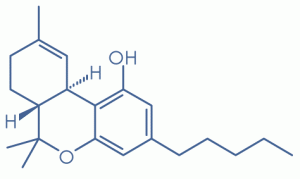Marijuana enthusiasts love to talk about THC potency. They chat about it excitedly on online discussion boards, discuss it with fellow tokers, and occasionally brag about how they enjoyed a particular strain with especially high THC concentrations. The problem is, they are often wrong because the reporting of THC is apparently unreliable. As 420 Magazine reports, “Across the country, numerous laboratories have been fined or suspended for manipulating potency results . . .”

The chemical structure of THC
Source: emcdda.europa.euIn the article, America’s Pot Labs Have A THC Problem, the authors make the following argument:
“America’s legal weed industry sold over $17 billion of pot last year and the industry’s obsession with THC, pot’s most famous intoxicant, has created financial rewards for every marginal increase in THC potency. Weed shoppers use THC percentages like nutritional labels, purchasing products based on their THC content, yet the lab system entrusted with measuring the compound is vulnerable to corruption.”
Dominic Corva, Social Science Research Director at cannabispolicy.com, affirms this phenomenon of “THC inflation,” writing, “High THC levels, which approach and sometimes exceed what is botanically possible, are inaccurate and misleading.”
Part of this may be the result of the increasingly competitive nature of the marijuana industry. As Corva points out, this practice is partly caused by marijuana companies who want to gain “unfair market advantage.”
Don Land, a professor of chemistry and forensics at the University of California, Davis, and an adviser to the multistate cannabis laboratory company Steep Hill is concerned, saying, “THC inflation is pernicious, it’s easy to accomplish and there are strong financial incentives to do it. I believe that it is likely to happen at least infrequently in every market out there, and there’s very little chance that labs would get caught.”
Nevada was a state that caught labs manipulating THC content. Dr. Jim MacRae, a data scientist and consultant from Washington, found that “The data indicated average THC content of marijuana flower tested at nine Nevada labs increased from a little more than 18 percent in January of 2018 to just over 22 percent in May 2019 with suspiciously low failure rates.” Department of Taxation spokeswoman Eden Collings affirmed MacRae’s suspicions, saying,“The information contained in his (MacRae’s) findings seemed to confirm that some marijuana testing facilities in Nevada were intentionally manipulating testing results.”
Land believes the problem may be difficult to fix, for reasons related to both demand and supply, the fundamental drivers of all commerce. With regard to demand, it’s really about a lack of integrity. As Land puts it, “The people paying for the tests are happier to get inaccurate tests that say [their products] are more potent than they really are.”
But there are also financial inducements on the supply end. “Laboratory tests have excruciating financial impacts on the US multibillion-dollar legal cannabis market. If a sample fails its quality assurance test, a farmer may have to destroy an entire crop of cannabis.” This combination of lack of integrity and fear makes the conditions rife for THC inflation.
The line that marijuana TCH concentration must not fall under appears to be 20%. If you fall below this seemingly magical line, your product may lose its competitive advantage. This dynamic is ultimately driven by consumer expectations. Consumers expect incredible THC levels because they correlate this with a potent high.
When you look up at boards that advertise marijuana products at a dispensary, they list the THC concentration right next to the name of the strain and whether it is indica, sativa, or a hybrid product. So right from the beginning, consumers are primed to look for THC as a purchasing guide. As Gold Seal brand co-founder and grower Neil Dellacava explains, “It’s the mark of death. If I have something that’s super-fire that’s 19.1[% THC], that’s borderline. If it was 18 or below, buyers try to negotiate the price down.”
Even for high-quality craft weed, THC menaces the equation. “The devastation really sets in when you know it’s a great strain that’s testing less than 15%,” said Ben Grambergu, for DYME distribution in Oakland, California. “At that point you’re almost dead in the water.”
Complicating matters is the fact that standards and measurements are not as precise as you might think, with huge variables between labs due to a lack of uniform standardization practices in the marijuana industry. As a recent leafly.com article points out,” Excessive test result variance between labs—driven in part by THC potency inflation—remains the original sin of the lab industry. The problem varies in size from state to state, but efforts to standardize and monitor labs have been slow in coming.”
Ironically, using THC as a primary target to make purchases is in reality, a poor way to make an informed pot-buying decision. While THC is certainly the most prominent and likely most important cannabinoid, it’s not the only factor to consider. As David Mapes, founder and researcher at Epsilon Research in Sacramento, California, argues, “You must remember that cannabis is not just about cannabinoids (such as THC). It also contains numerous types of constituents [such as terpenes] that are responsible for the various ways that those cannabinoids will act and how the body will react.”
Of course, there are more aesthetic factors to consider, such as the aroma, or taste, or eleven the visual appeal of the marijuana. Some people even love a great, catchy name. After all, who can resist Death Star, or Hippie Crippler?
At the end of the day, it’s about the full experience, so keep an open mind to the totality of the bud, not just the THC level.
At Newsweed.com, we adhere to three simple principles: truth, balance, and relatability. Our articles, podcasts, and videos strive to present content in an accurate, fair, yet compelling and timely manner. We avoid pushing personal or ideological agendas because our only agenda is creating quality content for our audience, whom we are here to serve. That is why our motto is ”Rolling with the times, straining for the truth.”
Your opinion matters. Please share your thoughts in our survey so that Newsweed can better serve you.
Charles Bukowski, the Los Angeles beat poet that captured the depravity of American urban life once said, “There is something about writing poetry that brings a man close to the cliff’s edge.” Newsweed is proud to stand in solidarity and offer you a chance to get close to the cliff’s edge with our first Power of Poetry Contest. Are you a budding bard, a versatile versifier, a rhyming regaler? Do you march to the beat of iambic pentameter, or flow like a river with free verse? If so, here’s your opportunity to put your mad poetic chops to the test. Enter our poetry contest for bragging rights and an opportunity to win some cash!






